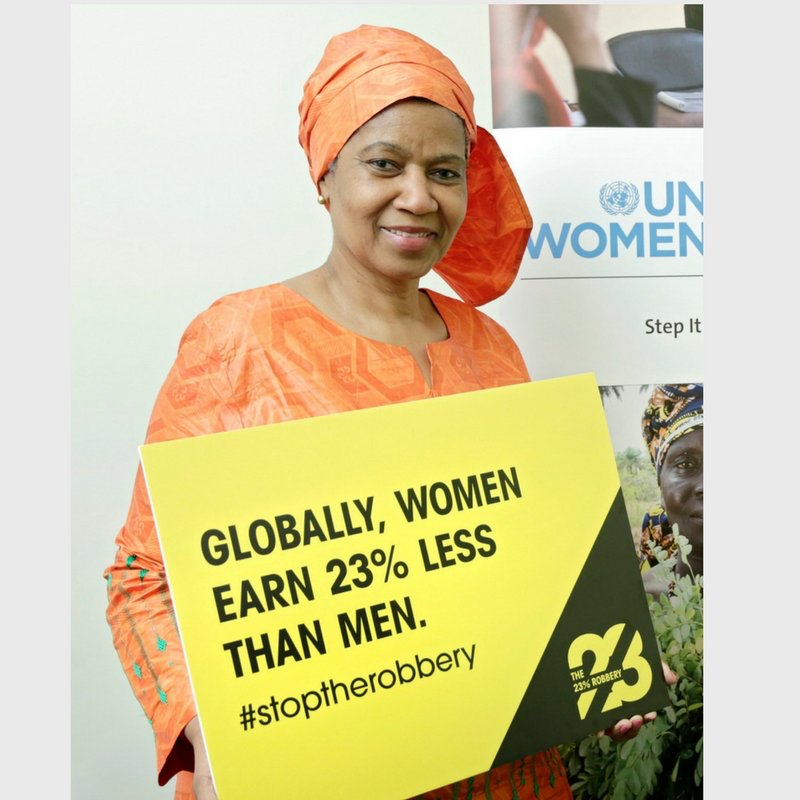INTERVIEW: “Gender Equality is everyone’s business ,” Phumzile Mlambo-Ngcuka

Editor - NAW
A number of reports indicate that more women in positions of power – from parliament to the boardroom – is fertile ground for political and economic stability. Yet bridging the gender gap is where Africa still lags behind, even after decades of trying. Why? Our editor, reGina Jane Jere, sought some answers from the then UN Women Executive Director Phumzile Mlambo-Ngcuka.
New African Woman: It’s been over 20 years since the landmark Beijing proclamation on gender equality, why is gender inequality still such a big and unending issue after all that has been done to dismantle it over the years?
Phumzile Mlambo-Ngcuka: The fact that gender equality is yet to be achieved, not withstanding all the good work that has been done, is obviously very disheartening. We do know that strides have been made in almost every country in the world, although some have done better than others.
And the fact that we have now identified the significant areas and interventions that are required for gender equality, means that we have found a methodology for driving towards substantive and sustainable equality, because what we have learnt in many cases, is how to create change that lasts. And in the SDGs [Sustainable Development Goals] that is what we are trying to do.
But can you actually pinpoint specific examples of gender equality measures that are sustainable or have succeeded and lasted?
Yes, of course. In the 17 SDGs, we have created indicators that recognise that gender inequality is complex and therefore it requires comprehensive interventions. Therefore, if we look at the issue of poverty, for example, we have specific intervention areas for women. If we look at the issue of infrastructure, we are looking at how to invest in infrastructure for women, especially in areas of social infrastructure such as water, sanitation and energy, in order to reduce the burden of care for women, who have to take care of these responsibilities where the infrastructure doesn’t exist.
In the Goal that also deals with decent work and growth (SDG Goal 8), we are advancing the kinds of growth and macroeconomics that will actually specifically work for women. Unlike before where gender equality was a women’s movement in the forefront, we have now institutionalised it and made gender equality everyone’s business.
SDG Goal 5 looks at gender equality in a deeper way; we are pushing for the engagement of men and boys, who are part of the problem and the solution.
In many African households and traditions today, the culture of subordinating and domesticating girls and women is still deeply embedded. Most families don’t even know what SDGs are and they are removed at grassroots level. Equality should start from the home, don’t you agree? And how is this being overcome?
I think we need to have an ecosystem in almost every country, because it is true we are not inside every home, and nor are the activists. But we need to orchestrate an ecosystem that every family will be exposed to. To do this we have been working in every country with the leaders, the heads of state, urging them to take up in their own right the issues of gender inequality and to demonstrate zero tolerance.
I have to say, we have had varying levels of success, but also we have people who, if you like, are shapers of attitude. Our HeForShe campaign, for example, calls out male individuals and leaders on what changes they will commit to bring about, using their relative advantage because of the positions they hold in society.
We have had cases where mayors of some cities have said they are prioritising provision of homes to those headed by women. In the private sector, any CEO who is not looking into the issue of the gender pay gap – currently at 23% globally – is presiding over a situation where women are being robbed of 23% of their pay packet.We have had some companies that have committed to ending inequity by 2020, but we would like this to end tomorrow, because each day that goes by, women are losing out.
What I am saying is that we are recognising that where men have authority – and women are not going to unseat them tomorrow – we need to make them more gender-sensitive and give everybody a responsibility to be a change-maker on the issue of gender.
Speaking in one voice on gender issues has been raising concern. As such there is now a “common African position” on gender. How is that helping in working with world bodies like UN Women, which you head, in advancing African women’s gender parity calls to action?
We rely a lot on the citizens of the countries themselves, because they can do more than us, otherwise we are overestimating our capacity. UN Women needs the support of ministers. We also work with civil societies and with young people in every country, to infuse ideas that energise the issue of gender equality. But nothing beats the involvement and participation of citizens themselves. As a result, we are pushing for a strong agenda of movement building amongst women, because the women’s movement goes up and down in its strength. The importance of building a strong women’s movement is therefore very crucial.
Some female leaders have said publicly that they get more support from their male counterparts than they do from fellow women. What do you say to those who assert that women are their own worst enemies as they don’t effectively support each other and the movement is fragmented?
I think there are still a lot of stereotypes. The people that are well placed to be leaders are men. The very fact that the people with the biggest pull are men, who still occupy the biggest space in leadership, further advantages men, even in the eyes of women. The other issue is that there aren’t always enough women willing to stand for office.
In some cases the level of harassment that women face, which sometimes is life-threatening, and the kind of stress that comes with some leadership positions – especially with the fact that the division of labour at the household level still places a bigger burden on women – contributes to reducing the number of women going for leadership positions.
We therefore need to be levelling out the participation of men and boys at home in order to create and increase the participation of women in positions outside their homes. It is a package.
But surely the issue of the division of labour in the home is steeped in individual family perceptions – how do you get that message across?
There are many solutions to this and the role of the media is also very crucial. We need the media to talk and write the correct language, and avoid advertising that perpetuates embedded stereotypes about the role of women in their societies or household.
We need our religious leaders to take on the fight, we also need our education systems to do much better for girls and boys than it is doing now to challenge any form of stereotypes in the classrooms.
There is a crucial need for the message of gender equality to be more visible, through all forms of media. This is a huge responsibility for leaders to talk about to the grassroots. We need the social and civil society movements, we need to involve academia, and maximise the use of digital and new media as platforms of engagement. The noise is not loud enough. We should get louder. There is more need to show the cause and effect of gender imbalance.
You rightly point out the role of the media, however may I also draw your attention to the fact that the media remains very male-dominated? Is it harder to get the gender message and causes across on male-dominated media?
In all these spaces, it very important that the people in the top hierarchy see the advantage of being gender-sensitive to all issues. Like I stated earlier, it is the male leaders who must make things happen and they should know that the beneficial effect of diversity in institutions has been proven. It has been demonstrated that gender equality is an economic advantage. But we also need women who are already in such spaces – media or private sector – to be gender champions. They know the issues much better and can present them in a much more dynamic way.
It is a responsibility of everyone affected by the issues to be part of the solution. Those women who are already empowered need help to empower others by being champions in their workspaces.
‘Women’s Economic Empowerment in the Changing World of Work’ is a loaded theme, and youth, more so young women, are at the bottom of the employment ladder. How do you empower such youth and convince them of job opportunities that don’t actually exist or are very few?
It is important that the education of young people prepares them for different opportunities that exist in the labour market. We also need to prepare our youth to take on leadership roles. The education system sometimes does not look at such roles. Also in most cases there is still the pigeonholing of girls in terms of career choices, encouraging them into careers that are not dynamic, those that are less profitable and as such they do not turn into future role-models. That does not benefit any of us.
This is why, the issue of ‘Women in the Changing World of Work’, which was the theme for this year’s International Women’s Day, is crucial. The aim is to achieve Planet 50-50 by the year 2030. We are saying that in order to achieve this, we need to start at a very early age, because we lose the plot when we leave it too late, especially for the girls.
We need to set the trajectory early for girls, so that they grow up differently, by helping them through education, tasks and chores at home, that deconstruct the stereotypes and norms that negatively affect both girls and boys from the very start in the home.
We have to deliberately expose them to a variety of opportunities in the labour market, both in the public and private sectors. Instead of encouraging girls into social and domestic fields, let them go more into science and technology. But we need to broaden their horizons from the very onset, not later.
“We need the media to talk and write the correct language, and avoid advertising that perpetuates embedded stereotypes about the role of women.“
**This interview first appeared in Issue 42 of the New African Woman Print Edition


















